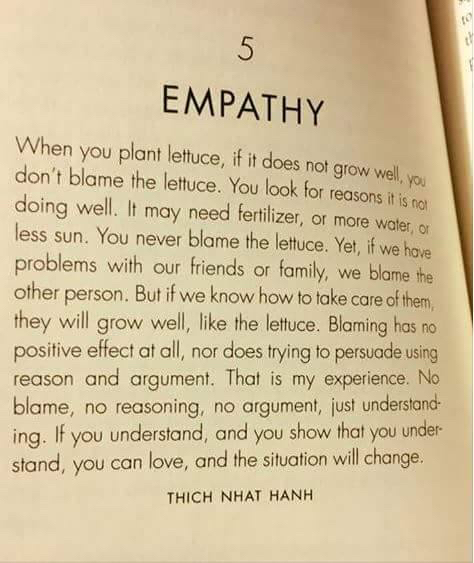What would you think if I told you there is a singular concept, that when put into practice, can dramatically improve both your personal and your professional life?
Through the end of 2017 and into 2018, there is one term that I’ve continuously encountered in my experiences. It has been a common theme in many business conferences I’ve attended. It’s has been a common topic of many conversations. It has been a solution to many problems. In fact, putting its meaning into practice has made me a better person. And it can do the same for you, if you understand and appreciate its power.
So what is this potentially life-altering concept?
It’s empathy.
While I don’t think I’ve ever really understood the definition of empathy prior to this exploration, I certainly didn’t understand the value of it — until recently.
Empathy is defined as:
The action of understanding, being aware of, being sensitive to, and vicariously experiencing the feelings, thoughts, and experience of another of either the past or present without having the feelings, thoughts, and experience fully communicated in an objectively explicit manner.
Or, much more simply, it’s the ability to understand and share the feelings of another.
MY PERSONAL EXPERIENCE WITH EMPATHY
2017 brought me a 6-year-old daughter. I have developed an endless amount of respect for all parents, everywhere. Adjusting to parenthood has not been easy for my wife and me, and in fact has been substantially more challenging than we could have imagined. This experience has taught me personally just how selfish I was, and really, how selfish anyone is who is not a parent. The ability to do as you choose freely, to prioritize your own wants/needs first, is something that should not be taken for granted, pre-parenthood.
Every parent will have their own experiences, and while it is fun to relate and share commonality, we should all appreciate each other’s unique path. The scenario of when the doctor tells first-time parents “well, you are free to leave the hospital with your newborn child now, good luck”, is probably more consistent with my experience, except with a 6 year-old.
While initially angry when people would compare my situation with theirs, I realized it was just a lack of empathy and understanding. This life-changing scenario for me personally, has really opened me up to the topic of empathy in many regards.
MY PROFESSIONAL EXPERIENCE WITH EMPATHY
Managing Teams
One of my companies has experienced rapid growth as we grew to 26 staff members; and never did I imagine co-managing such a large team. Having said that, it is with this incredible team of mine that has helped me to understand one of the most important lessons of empathy: listening freely without assumptions.
Each day, it is important to be cognizant of your current personal thoughts and emotions. Understanding that each conversation you participate in, the person on the other end has their own set of thoughts and emotions. This includes different backgrounds, a different set of problems or struggles, and a different set of motivations and aspirations. It is the act of being present in each conversation, and understanding who you are communicating with, that allows for more rewarding conversation.
For example, in receiving a nasty email from a client complaining about a ‘mistake’ that my team had made, I decided to do some research in understanding both the client and my staff members’ perspective. Come to find out, the client was in the wrong, and while I had to smile and fix the problem for them, I did not get upset at my staff member for receiving the email.
While a simple solution, it is easy to see how the situation could have gone the other way. Practicing empathy for those that have a team they are responsible for, is an instrumental part of being a good leader.
Salesmanship
I love Gary Vee’s 51/49 rule, which is simple and states to give more than you get. This can be translated to listen instead of self promote. Let your prospect do the majority of the talking, and let them tell you what they want (and what they don’t want). Let them share their thoughts and experiences, before you offer yours. If you give your prospect the advantage, it is much easier to leverage your 49%, when the person you are engaging with feels like they have the 51%. This isn’t about a game however; it is more about understanding the person you are talking with, and showcasing empathy towards your counterparts’ comments.
The key again really, is just listening before speaking. This is not negotiation 101 of ‘don’t put your cards down first’, this is truly understanding what your prospect client is trying to accomplish. What is their problem? Can you help them solve it? Do you have the tools to do so? How have you done this before?
In spearheading the business development for my marketing agency, there has been a consistent refinement of the way I explain what my company has to offer. Typically, I would sit down with a prospect, and ‘pitch’ them on how great we are, and what we can offer. How much does this really differ from other companies that offer the same thing? You want to create connection and dialogue through understanding and cohesion. This is better done by listening first, and curating a better response.
TAKEAWAYS AND LEARNINGS
Daniel Goleman, a science journalist and author of the New York Times bestselling book Emotional Intelligence, spoke at the Global Synergy Forum, which I attended in October 2017. The topic of empathy was mentioned several times throughout his dialogue.
Goleman sees empathy in 3 different types: emotional empathy, cognitive empathy, and empathetic concern. For example, when you listen attentively to understand the other person’s point of view, you are not answering with emotional empathy but cognitive empathy. He has expressed in his speaking engagements and in many publications about the importance of empathy in relationships. Goleman is quoted saying that “empathetic people are superb at recognizing and meeting the needs of clients, customers, or subordinates. They seem approachable, wanting to hear what people have to say. They listen carefully, picking up on what people are truly concerned about, and respond on the mark.”
– – – – –
Nothing is more exciting (for me at least) than participating in engaging conversation. Before diving in, and providing insight or my feelings, it will help to collect feedback and perspective. Understanding the viewpoints of those participating in any subject conversation, ultimately allows for a deeper, richer conversation.
In each business pitch, through each relationship, and with every single engagement of human interaction, empathy plays a role. Start with just being present in every conversation. You’ll soon learn than empathy can help better enrich your life and is a concept that everyone can and should work on.
EXPLORING EMPATHY IN ORLANDO
As I was noticing “empathy” becoming an increasingly trending topic in my life, I had the privilege of engaging in a great conversation with Orlando’s Danya Shea. Shea has dedicated a lot of her work to the modeling and framework of empathy in the workplace. Having heard her speak at Creative Mornings back in September, it served to amplify the theme of “empathy” in my life. It became evident that not only was Shea very passionate about this topic, but she is a true thought leader.
Shea and her team at FervorWorks are producing “Empathy And...”, a talk series with forward-thinking founders and leaders. You can learn more about the events here.
To learn more about Shea, read my friend Dean Caravelis’s piece and interview on her.
For some more great empathy insight, read this article that discusses 6 habits of highly empathetic people.





